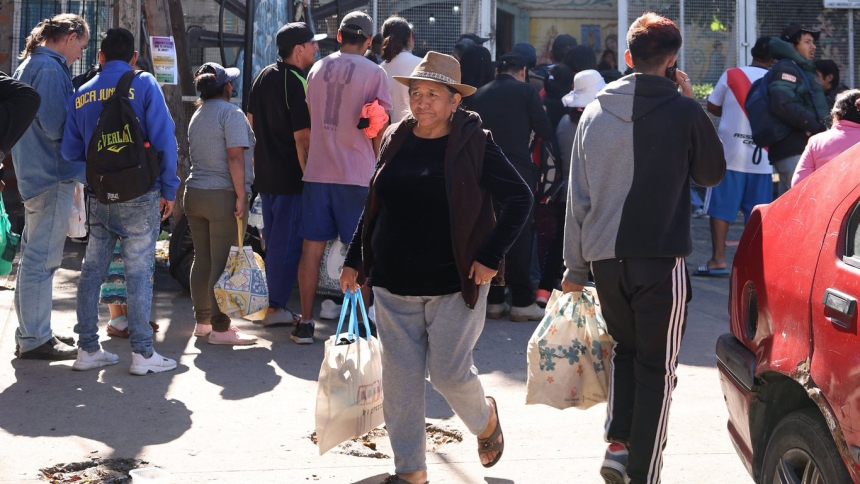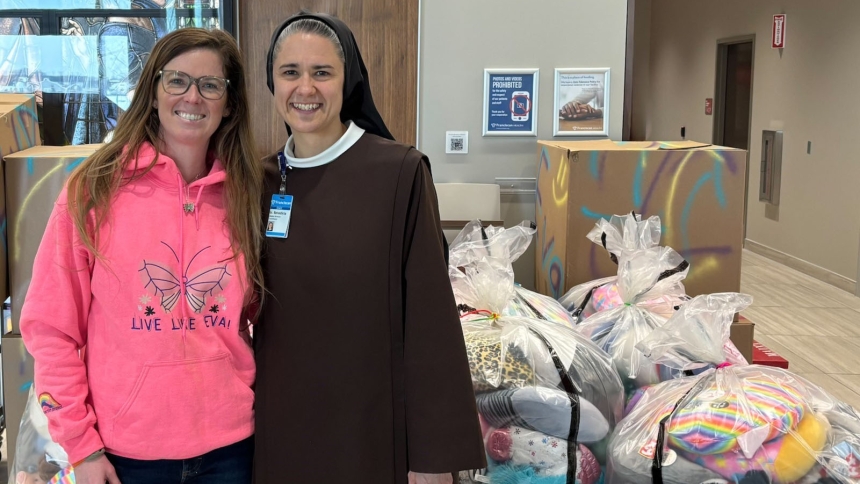
BUENOS AIRES, Argentina (OSV News) - In the tough slum neighborhoods of Buenos Aires frequented by Pope Francis before his election in 2013, the church is often the only social service facility available.
As well as leading people to God, Father Pedro Cannavó is acutely aware of his role as a community leader and a provider for the material as well as spiritual needs of the people.
OSV News spoke to Father Cannavó outside the simple parish church of Mary Mother of the People in the shadows of the famous San Lorenzo Stadium in the Argentine capital, as hundreds of people were patiently queuing up.
Mostly women and children, they were waiting in line to receive a hot meal from the parish soup kitchen. Established during the COVID-19 pandemic, Father Cannavó told OSV News "now the need is even greater."
"When the pandemic started, we had to move quickly because people had nothing," he said. And, so the soup kitchen was born.
Father Cannavó was ordained by then Cardinal Jorge Bergoglio in 2009, just four years before the Jesuit archbishop would be chosen by his fellow cardinals to succeed Pope Benedict XVI.
"Padre Jorge," as locals refer to him, is remembered fondly. "He used to come here to be with us often," according to Nipo Chan, an elderly guest of the soup kitchen whose parents came as immigrants from Japan before World War II.
"Other people can say they saw the pope, or they heard the pope - here we can say, 'He baptized my child' or 'He gave first holy Communion to my family,'" Chan said, beaming with pride.
Those helped by the soup kitchen are hopeful that the pope will soon pay them a visit. "We loaned him to the world, but now we want him to come back," Chan told OSV News to enthusiastic approval from his fellow diners.
"When he first got elected, you should have seen it. Everyone in the neighborhood had a son, a niece, a sibling, who had been baptized by the pope, confirmed by him or received first Communion from him," an elderly woman added.
The main soup kitchen of the parish feeds around 3,000 people every day. A further 1,500 meals are distributed to people in their own homes who are unable to come to the facility.
Father Cannavó told OSV News that the soup kitchen has been a steep learning curve. "We found out that a lot of the older people have heart problems, so we have to be careful about salt making their condition worse," he said. The soup kitchen now has two satellite facilities that specialize in low-sodium options for elderly people.
Access to health care is a major issue in slum communities, and as OSV News entered the parish church - which doubles as a funeral home - a "wake" for a young woman was taking place. Father Cannavó explained that she had died of dengue, a viral infection transmitted to humans through the bite of infected mosquitoes.
According to the World Health Organization, most dengue infections are asymptomatic or produce only mild illness. However, in the slums death is not uncommon, Father Cannavó explained, because of underlying health vulnerabilities.
"That is why we try to 'get' people before they get sick," Father Cannavó told OSV News. He explained that a vital part of the work of the soup kitchens is also to make medical services available to people who could not otherwise avail of this.
"We have volunteer doctors, volunteer nurses and medical students, who come and give of their time to treat people. … Often this is the only access to health care that these people can have," Father Cannavó explained.
Poverty levels have skyrocketed to 57.4% of Argentina's 46 million people this year, the highest rate in 20 years, according to a study by the Catholic University of Argentina.
About 27 million people in Argentina are poor and 15% of those are mired in "destitution," meaning they cannot adequately cover their food needs, according to the study released in February.
According to Catholic University's research, the increase in poverty levels was partly due to the devaluation of the Argentine peso applied by recently elected president Javier Milei.
This resulted in an increase in the price of food, services and non-food goods.
Milei, an economist, argues that the economic shock measures - while painful - are needed to curb triple-digit inflation.
For Father Cannavó and the volunteers at Mary Mother of the People Parish, the work goes on.
"We are here for the needs of the people … and every day the need seems to be greater," he told OSV News.
Caption: People are pictured in an undated photo waiting in line for a meal at Mary Mother of the People Parish soup kitchen in Buenos Aires, Argentina. (OSV News photo/Margaret Murray, Pontifical Mission Societies USA)



